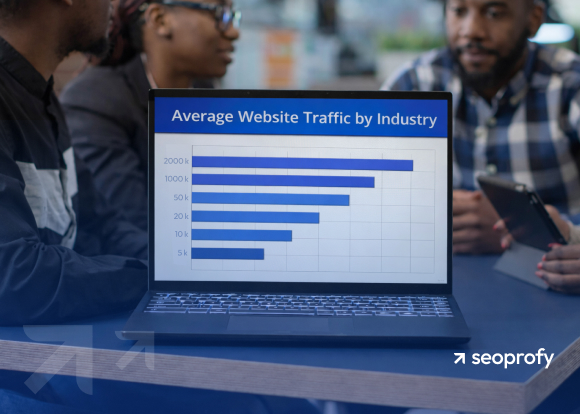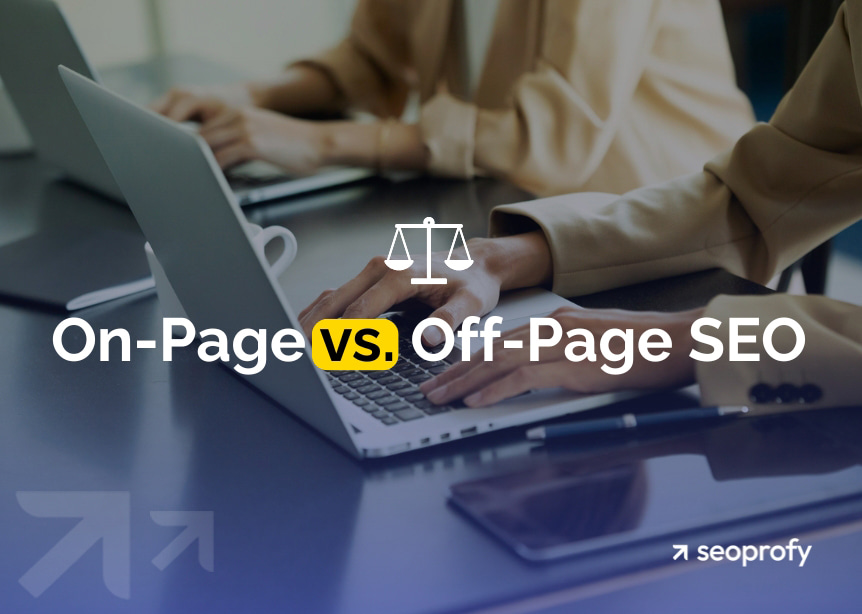Being visible to local clients online is critical for any law firm. However, many skilled lawyers are still not getting noticed on Google when people in their area search for legal help. Local SEO for lawyers will be your best solution if your online presence doesn’t bring you leads.
When someone needs legal assistance, they should come across your firm before they find your competitors. It’s more than possible with strong local SEO best practices we share in our local SEO guide for lawyers. Nonetheless, juggling a thriving practice while adapting to both Google’s evolving search algorithms and changing patterns in how customers use the internet is hard. So, why not let SeoProfy handle the marketing side for you?
- Relevance, proximity, and authority are the main factors that impact your local search rankings.
- Fully completed Google Business Profiles gain 2.7 times more trust from potential clients.
- 82% of people check reviews when looking for legal services, with 40% saying it influences their choice of law firm.
- Each location needs its own dedicated web page.
- Keyword research requires understanding search trends and user intent.
- Link building should prioritize quality over sheer numbers.
- Key local SEO KPIs include local pack rankings, profile views, website visits, and conversion rates from specific locations.
What Is Local SEO for Lawyers?
Local search engine optimization for lawyers is a digital marketing strategy that helps law firms improve their websites’ rankings in search engine results whenever potential clients search for legal services in their geographic area. Local SEO best practices also focus on traffic increase and converting this traffic into qualified leads.
Here are the main components of local SEO for lawyers:
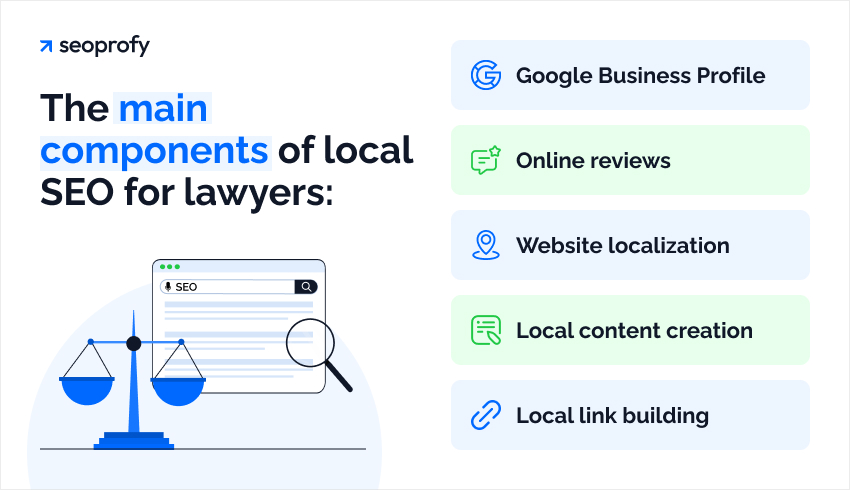
- Google Business Profile: Whenever your client needs a local business, it’s very likely that they go to Google Maps, or choose business listings at the top of organic search results with star ratings. Google Business Profile is your firm’s official business listing. You need to include an office location, accurate business hours, a service list, some photos, and other details to make this work. And when it does, your company will appear in the local pack (top three local business listings) when people search, like here:
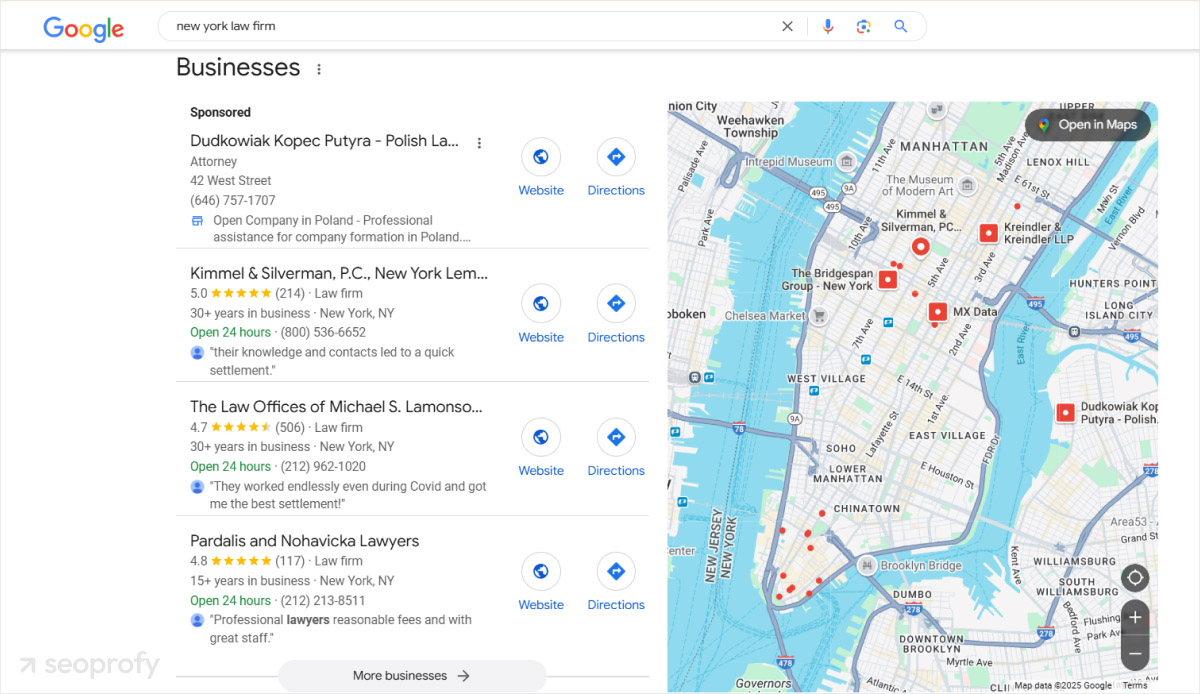
- Online reviews: Authentic client reviews on your Google Business Profile and other legal platforms are critical for your visibility. Let your prospects see others’ experience with your company, for instance, how you handled their case, your communication style, and the outcome achieved, and you’ll be able to build trust with both potential customers and Google algorithms.
- Website localization: When your leads visit your law firm’s website, they should easily understand what services you provide and in which cities and states. Each page should be filled with local keywords (like “personal injury lawyer NH”), contain your office address, and more.
- Local content creation: This is about content that targets people in your particular service area. You might write about local court procedures, state-specific laws (like the statute of limitations in Massachusetts for personal injury cases), and any other topics your audience might be interested in.
- Local link building: Your website should be regularly mentioned and linked to other reputable local websites. Whether it’s your city’s chamber of commerce, local news outlets, or community organizations, search engines will consider your firm as more credible and relevant to offer it to local searchers.
Benefits of Investing in Local SEO for Lawyers
Why is local SEO important for law firms? Here are some of the main reasons:
- Smart money spent: Why spread your message everywhere and spend more when you can reach those who actually need you? Local SEO for lawyers redirects your budget to reach more qualified leads.
- Trust creation in your community: Local SEO for law firms isn’t just about having good local rankings. With practices like showcasing positive reviews, pictures of your office, and other business details, you can build trust with your audience before they even pick up the phone to call you.
- Strategic advantages over other firms: While many law firms excel in the courtroom, they often lag behind in digital marketing, particularly in lead generation for lawyers. By implementing strategic SEO practices, your firm can capitalize on this gap in lead generation and secure prominent positions in local search results, directly connecting you with potential clients actively seeking legal services.
- Competitive edge over larger firms: Smaller law firms can actually beat the big players in local searches. Sure, larger firms might have huge marketing budgets, but local SEO for lawyers still lets you compete for local clients.
You might wonder whether it’s easier just to pay for Google ads than to invest in local SEO for a law firm. Pay-per-click (PPC) can bring you instant visibility. You pay, you show up, you get clicks, so it’s fast and direct, especially for new law firms.
But our experience shows legal keywords are among the most expensive, often $50+ per click (and some highly competitive terms may even reach $300 per click). Visit our SEO guide for lawyers to discover which legal keywords are the most expensive.
Plus, people tend to trust organic results more than ads. And should you stop paying, your PPC campaign will stop bringing you results accordingly.
No, we don’t claim PPC isn’t effective at all. It’s just not the option to rely solely on it if you want to future-proof your local search presence. SEO is a more reliable approach in this case since it builds lasting value.
Looking for more high-quality local leads? Our law firm SEO company will help you rank higher on Google and increase traffic to your website. Here’s what we offer:
- Websites’ SEO audit for law firms
- Strategy creation and setting goals and KPIs
- Native niche-expert writer services
- Brand promotion

Top Local SEO Ranking Factors for Law Firms
Google’s mission is to connect those in need of legal assistance with the best local law firms. Overall, the search engine takes hundreds of factors into account when it comes to regular SEO. In the case of local SEO for law firms, here are the most critical ones:
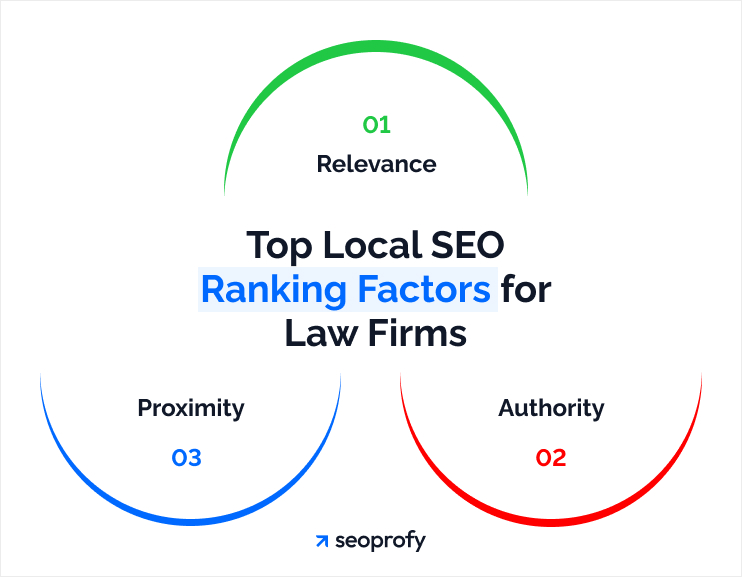
- Relevance: Speak your prospects’ language, and Google will match you with them. Your pages must show what type of law you practice and where exactly you work. Each practice area needs its own detailed page optimized with relevant keywords. To make them relevant, consider what people may type when they search for a lawyer — these are your key terms.
- Proximity: Simply put, how close your office is to the person searching. Google shows people lawyers they can actually reach. For this, your office location needs to be listed on Google Business Profile. If you have multiple offices, each one must have accurate information online.
- Authority: Expert content that draws from your hands-on knowledge and proven sources helps Google recognize your business as reliable for local clients. Moreover, it’s essential for the top search engine to see evidence of your strong client relationships and credibility. This is why the importance of law firm reviews for local SEO is significant, both their quantity and quality. These testimonials can be published on your Google Business Profile, as well as legal directories and local business listings.
Top 9 Local SEO Strategies for Law Firms
Let’s move from understanding to doing. We’ve gathered the most effective local SEO tips for law firms.
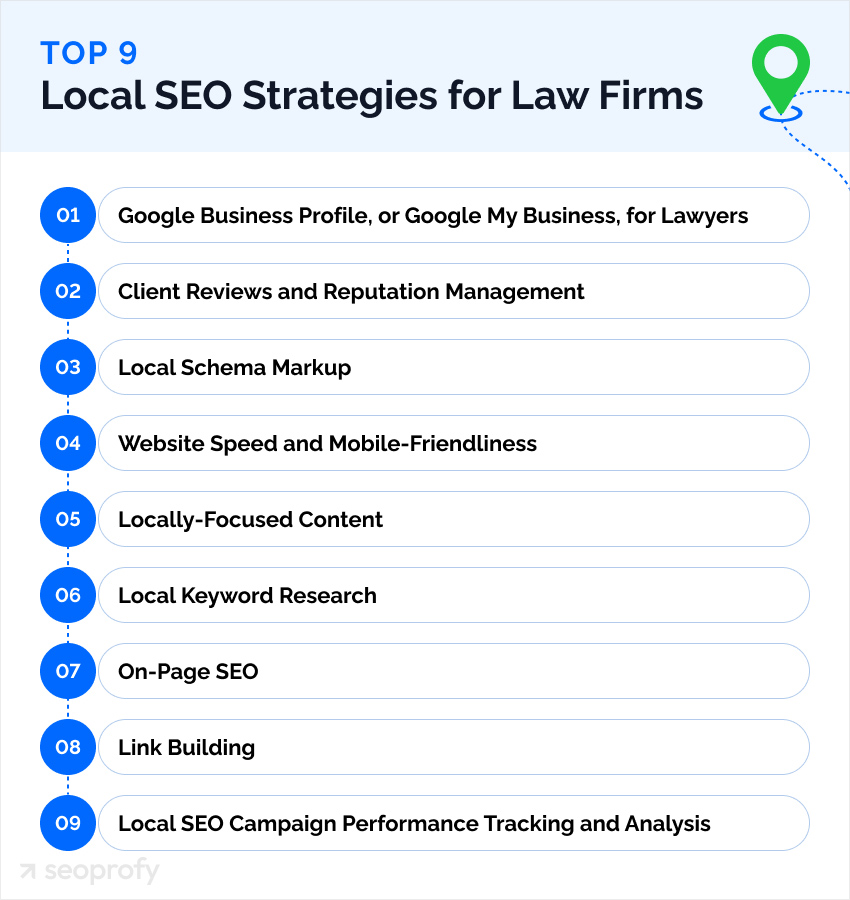
Google Business Profile, or Google My Business, for Lawyers
Businesses with complete Google Business Profiles earn 2.7x more trust from potential customers searching online. That’s why we start our local SEO checklist for law firms here — your Google Business Profile listing will shape the very first impression potential clients have of your business. Here’s what your profile will look like:
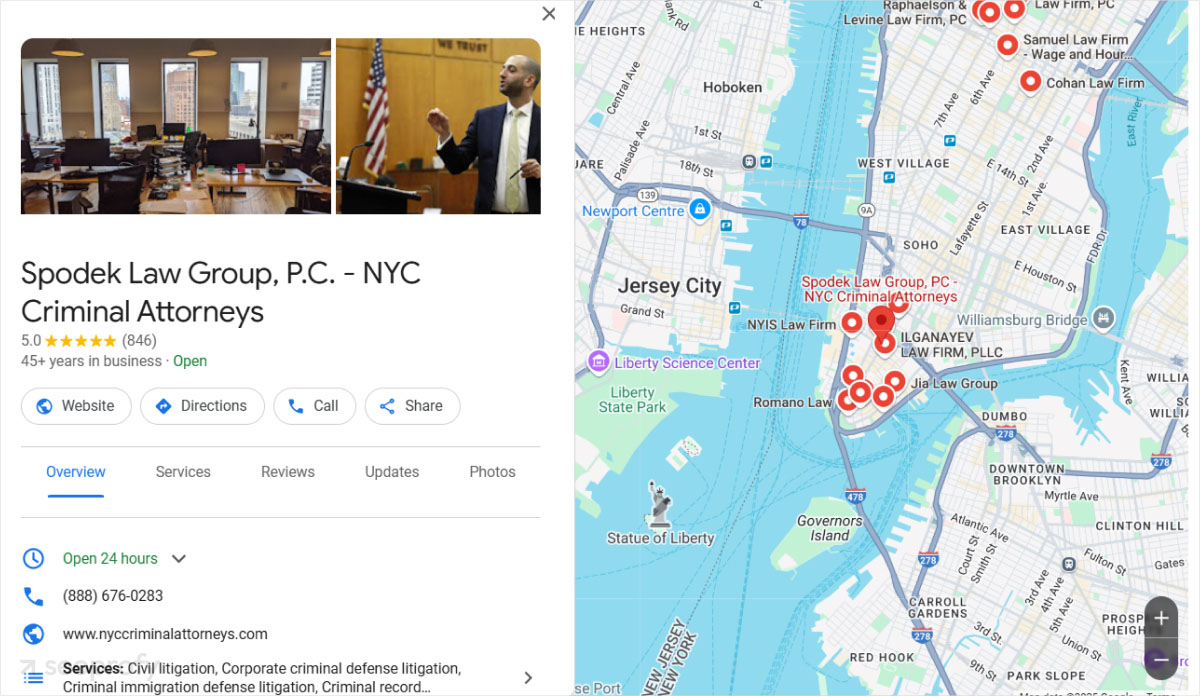
Begin with accurate basic information — your business name, address, phone number, up-to-date office hours, and several pictures of the office building and interior. In addition, your profile needs to have business categories that reflect your practice areas (you can make “law firm” your primary category and then add more narrow areas like family law for the secondary one).
Important to note. While your Google Business Profile might show great rankings when you search from your office location, try to google your firm from another location, and you may not see yourself in the local pack.
Rankings can shift based on where someone searches from (remember about the proximity factor?). Your firm might rank first near your office but drop down to fifth place or lower in nearby areas. Thus, you should also aim to maintain strong rankings across your whole service area, not just right by your location.
This is why other local search ranking factors, like relevance and authority, equally matter for your Google Business Profile. This is the perfect scenario:

The green circles show where the business ranks in local results. Right in the center area, it ranks #1 consistently. Move a few blocks away, and it’s still at #2, and at the edges of the map, it drops only to #3. So, even with distance, your firm remains visible in the local pack.
Client Reviews and Reputation Management
Remember the last time you looked up a business nearby? You probably checked out their Google reviews. When people seek legal assistance, they often do the exact same thing (in 82% of cases). Since clients handle over serious matters to their lawyers, like big financial decisions or even their freedom, reviews frequently become the deciding factor in choosing a law firm (in 40% of cases).
Additionally, 89% of clients expect business owners to respond to all reviews. And this brings us to review management — another part of your local SEO strategy. Every reply demonstrates to Google and prospective clients that your firm is proactive and professional.
Google Business Profile matters most for local SEO for lawyers. Take a look at how reviews appear there:
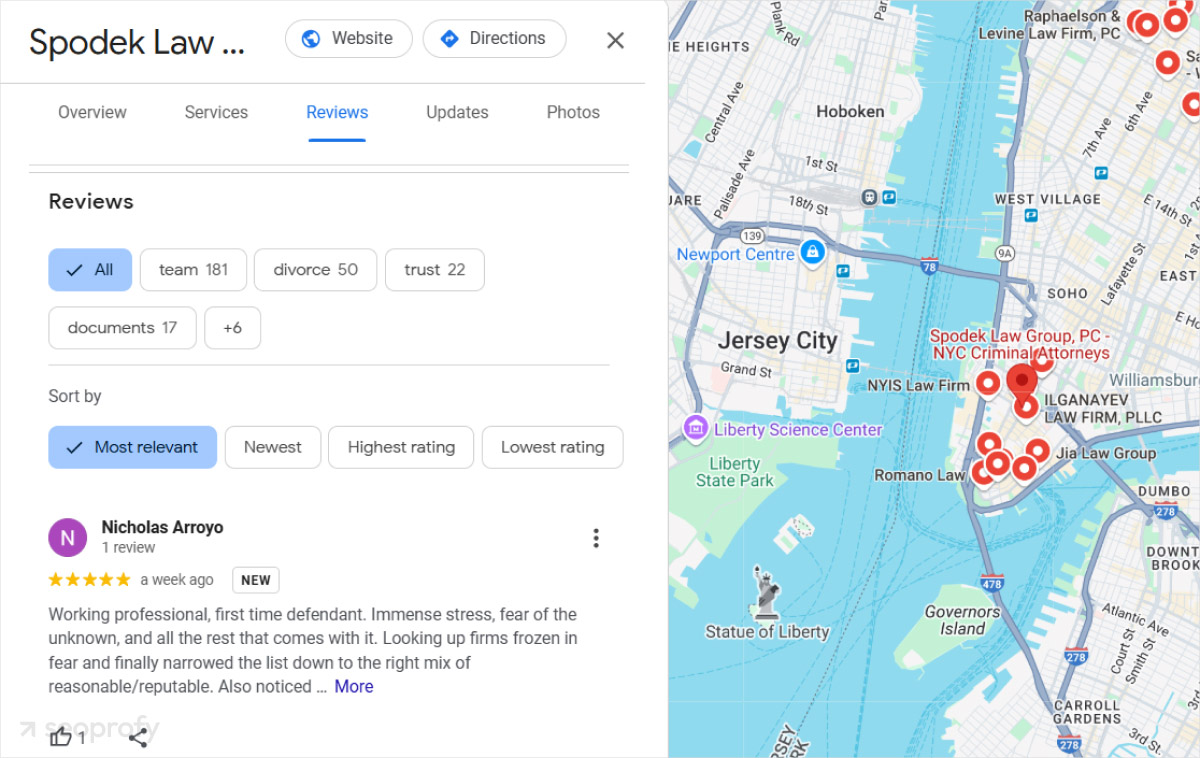
But you can go further and consider websites like Avvo to gather testimonials. These are industry-specific platforms that frequently dominate Google search results and may influence your potential clients’ decisions, too.
While negative reviews usually happen organically, collecting positive ones takes a little extra work. Just make it straightforward for your satisfied clients. You might send follow-up emails with direct links to review platforms.
Most importantly, ask for feedback at the right moment — typically right after a successful case closure when client satisfaction is at its peak. Sure, happy clients may do this themselves, but sometimes, they just need a gentle reminder to share their experiences with others.
Local Schema Markup
As you visit your website, you’re greeted by well-organized information — your address, phone number, services, and more. However, Google needs a guiding hand to decipher what each piece means.
Schema markup (a special code added to your website) serves as that guiding hand. It instructs Google: “This is our contact number” or “This is where you can find us.” Without schema, Google simply sees a string of numbers: 507-03-42. But with schema, it recognizes: “This is the official phone number belonging to this firm. Then, Google uses this information to show your firm in rich snippets (detailed search results with stars, hours, and other quick facts).
While schema markup doesn’t directly improve rankings, it enhances visibility in local search results by increasing click-through rates (CTR). Engaging rich snippets attract more clicks, signaling relevance to search engines. Higher engagement can improve positioning and make your firm more discoverable and credible.
Schema lets you highlight your best features, such as the five-star rating and the number of reviews, directly in the search results. These visible indicators encourage leads to visit your website or read your reviews to build complete confidence in your credibility.

If you want to receive notifications regarding any errors related to your schema markup and get other alerts about your local SEO performance, we recommend connecting your website to Google Search Console.
You might need assistance from a developer or a savvy technical SEO expert to set up local schema markup since this is quite a technical thing. But should you choose to tackle local SEO for lawyers yourself, remember that even minor mistakes in schema markup can leave Google confused about your site’s information. That’s why testing is crucial. Google offers a couple of handy tools for that: The Rich Results Test and The Schema Markup Validator.
Website Speed and Mobile-Friendliness
Many of your clients search for legal information while dealing with stress, maybe after a car accident or during a family crisis. Their patience is thin, and they can’t afford to wait for slow-loading pages. What they need, and fast, is clear content that’s easily digestible on their mobile devices. This underscores the importance of every second.
Therefore, your website must:
- Load seamlessly across all devices
- Clearly present your contact details
- Display practice areas without zooming
- Keep forms short
- Make it easy to tap the “call now” button
What’s more, Google also takes into account your site’s loading speed and mobile functionality when determining your ranking in local search results. In fact, it has specific criteria regarding your page performance, known as Web Vitals.
Your loading speed (referred to as Largest Contentful Paint, or LCP) should be around 2.5 seconds, and the response time when a visitor interacts with your site (Interaction to Next Paint, or INP) must happen within 200 milliseconds or less. Additionally, your page’s content shouldn’t move while loading; strive for a Cumulative Layout Shift, or CLS, score of less than 0.1.
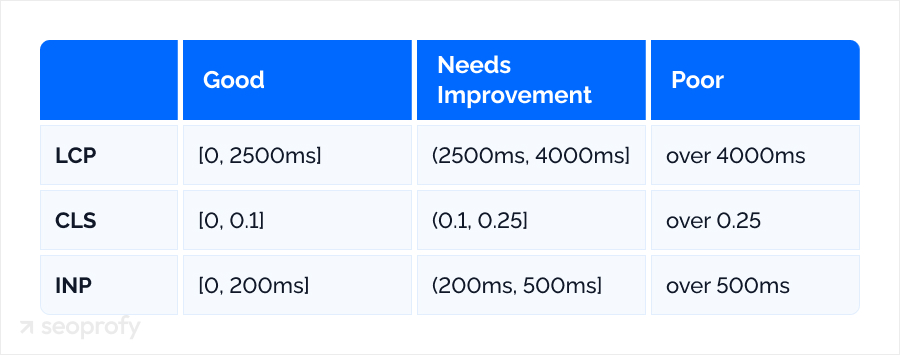
Here are some ways that can help you improve your page loading speed:
- Compress all images before uploading
- Uninstall any unused plugins and themes
- Activate browser caching, allowing visitors’ browsers to retain elements of your site for quicker future loads
- Minimize redirects on your pages, as they can create unnecessary delays
When it comes to mobile-friendly updates, consider the following tips:
- Design buttons that are easy to tap (at least 44×44 pixels)
- Space out menu items to prevent accidental clicks
- Use readable fonts (at least 16px for body text)
- Ensure that pop-up notifications don’t obscure crucial information
- Make your phone number clickable for instant calling
There’s an abundance of details to consider. Our SEO agency will gladly audit every facet of your website and overall online visibility to recommend fixes and highlight areas for improvement, including suggestions for better website speed and mobile experience.
Locally-Focused Content
Every state has its own laws. You undoubtedly know the ins and outs of your area, but it’s still important to prove this to your potential clients and search engine algorithms.
The more in-depth your content is, the better. If you discuss car accidents in your state, you could mention the specific comparative negligence standards your state follows so that your potential personal injury clients can understand what amount of compensation they may be entitled to. Back your information up with official sources, relevant statistics, and your own experiences. It would also be ideal if you find a way to mix professional confidence with empathy for your audience.
This idea goes for anything you post online — you should demonstrate expertise, experience, authoritativeness, and trustworthiness, as Google’s quality rater E-E-A-T guidelines require.
When it comes to local SEO for lawyers, it is essential to make separate pages for each location. If you serve Concord in New Hampshire, talk directly to the Concord citizens. And if you’re writing the same content for a different city, even if it’s in the same state, be sure it’s tailored just for them. Keeping different pages for each location helps clients find you more easily.
Local photos and videos can tell about you in a way that words sometimes can’t. Your website visitors may want to watch and listen rather than read. You could introduce yourself and your team on video or take a photo of each team member and designate their role. Or even publish video testimonials from your satisfied clients. See how Morgan & Morgan, the US injury law firm, did this:

This way, your leads will be able to feel more connected with you, as they can see real people they plan to work with, not only read their thoughts or scroll generic stock photos.
Local Keyword Research
Keyword research is more than combining your service (“divorce lawyer”) with your location (“Boston”) — it has many more aspects to take into account for successful rankings.
Keyword research indicates current trends in search results and highlights what triggers local packs. To reveal this, you can use tools like Ahrefs. Their Keywords Explorer shows what makes local listings appear in search results, while Site Explorer reveals which keywords your competitors rank for.
One of the most convenient and effective local SEO strategies for law firms is to conduct keyword research by using topic clusters, which create a network of related keywords. You can start with a main topic like “car accidents” and then define subtopics with supporting key phrases like:
- “Intersection accident liability Boston”
- “Rear-end collision compensation Massachusetts”
- “Hit and run accident lawyer downtown Boston”
When researching these keywords, you’ll notice they have different levels of search volume. High-volume terms are common but competitive. Medium-volume keywords offer a good balance of chances to rank and the local SEO efforts required, while low-volume terms are more specific and, thus, are used less frequently.
You’ll also come across keyword difficulty (KD). It shows how hard it would be to score a spot on Google’s first page for this particular keyword.
Here is how Semrush’s Keyword Magic Tool displays these parameters:
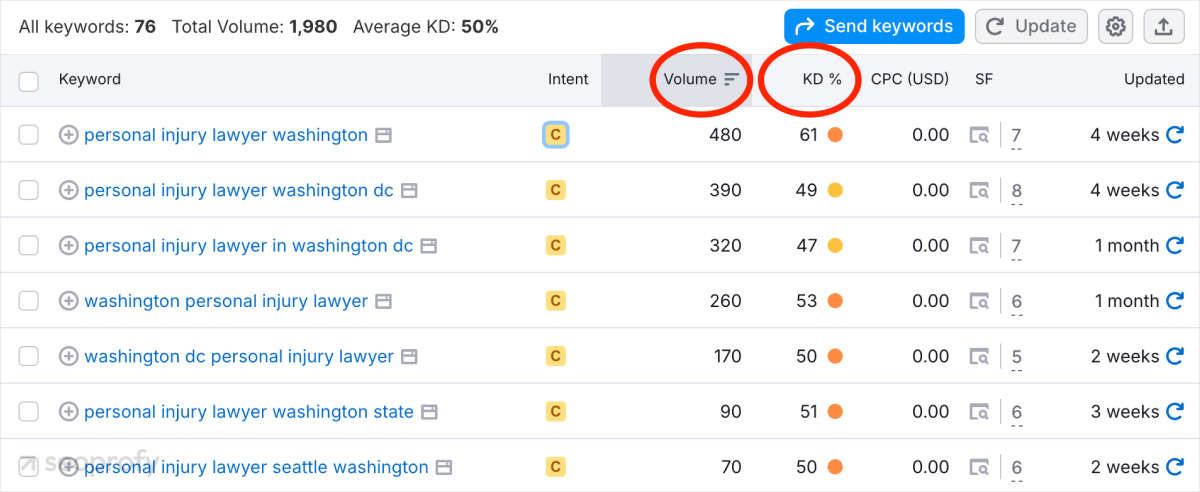
Lastly, each keyword carries its unique intent, and it’s necessary to keep this in mind during your search and when optimizing your pages. For instance, someone searching “what to do after a car accident” is likely looking for information, so that’s great for educational articles.
Key phrases like “best car accident lawyer Florida” reflect commercial intent, while “hire personal injury attorney LA” is more transactional. Keywords with this local intent are perfect for your landing pages that should lead to booking calls.
On-Page SEO
On-page SEO is everything you can control directly on your website’s pages to help them rank better. So, what’s included in on-page local SEO for lawyers?
- Title tags: The clickable headline you see in search results and browser tabs. Title tags are like book titles — often your first chance to grab attention. Each title should include your practice area, location, and firm type. For example: “Atlanta Car Accident Lawyer | Georgia Law Experts.”
- Meta descriptions: A brief 160-character summary of the page that appears under the title in search results and link previews when someone shares your page. Make sure your meta descriptions include your location, key services, and a solid reason for people to click on your page or choose your firm.

- Header tags: H1 tags are your page’s main headline. Lower-level headers (H2, H3) break up your content and must include variations of your local terms. This way, readers can easily scan your page, and search engines get a better idea of your content structure.
- Body copy: The main content of your page where you provide detailed information about your services. This text should include your target keywords and locations. Be careful with keyword staffing — Google and other search engines don’t like it and may penalize such pages.
- Internal links: Connections between different pages of your website. They help search engines understand how your various web pages relate to one another.
- URL structure: The web address of each page. When it comes to local SEO for lawyers, it’s a good idea to include both the service and location when it makes sense.
Link Building
Link building is an integral part of local SEO for law firms. You, as a local business owner, should look for backlinks from trusted sources in both your field and local area.
Here are some factors that make a source reputable:
- High domain rating (typically 60-70+)
- Traffic from your target area
- Regularly updated content
- Strong editorial standards
You have several ways to get local backlinks from such sources. First, you can identify existing content where you could place a link to your website and reach out to suggest including this link there. Alternatively, you can offer to write a guest post that provides unique insights for their audience and secure a link to your site. Some sources offer this option, some don’t. To find such websites, try to search for your niche + city + “write for us.”
It’s not always easy to acquire links from high-authority websites, so you can also register on local directories and professional associations. These groups often give valuable backlinks, as well as display core details about your practice, once you create an account with them. For example, when someone searches for “best New York law firms,” you could be listed in one (or two) of the sources below:
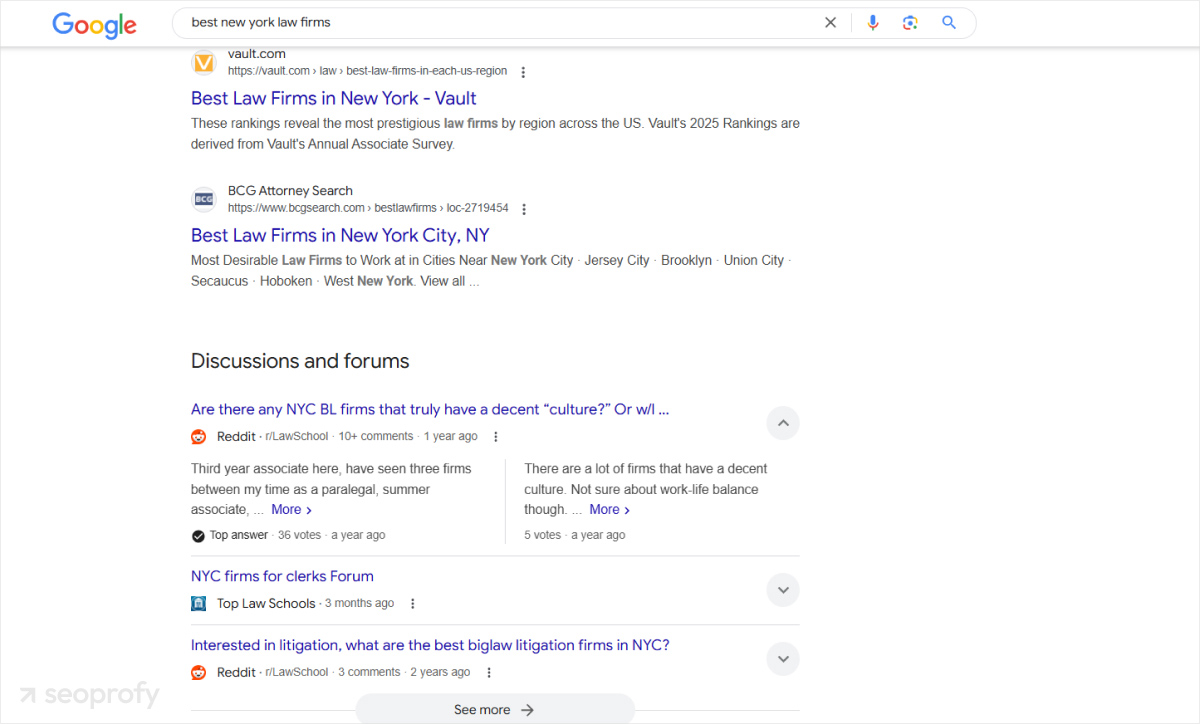
Let’s also mention some tempting shortcuts you should skip. We’re talking about black-hat SEO tactics for legal firms where website owners chase after links just for the sake of it and often end up with numerous backlinks from low-quality sites that just exist for this purpose. This might work at the beginning, but wait for the next time Google updates its algorithms, and you risk getting hit with penalties.
Local SEO Campaign Performance Tracking and Analysis
SEO performance tracking and analysis let attorneys understand their strengths and weaknesses in digital marketing and fix everything that must be fixed. Yet, according to law firm marketing statistics, 65% of lawyers are unsure which numbers actually count in their marketing campaigns. Don’t join their range!
Here are some examples of metrics to determine if you’re heading in the right direction:
- Local pack rankings
- Google Business Profile views
- Position for relevant local keywords
- Website visits from local searches
- Time spent on location-specific pages
- Contact form submissions by location
- Calls from specific service areas
- Consultation requests by legal practice area
- Local landing page conversions
If you notice any declines in these areas, you can always find out what’s wrong, fix it, and keep moving. For this, you should also monitor and analyze specific aspects of your SEO strategy.
For instance, it’s important to keep tabs on your backlink profile. Tools like Ahrefs Site Explorer can help you spot and reclaim links you might’ve lost — maybe due to website updates or if a site just decided to delete them.
We also recommend regularly checking your Core Web Vitals performance with Google Search Console or PageSpeed Insights. Tools like BrightLocal are great for ensuring your business data, like name, address, and phone number, stays consistent across all online directories. Ultimately, you’ll be able to assess if your local search optimization for law firms has generated the ROI you expected.
Conclusion
Local SEO for lawyers is about becoming the most relevant answer when someone in your area needs legal help. It works through off-page factors, such as your Google Business Profile, directories, reviews, and backlinks, and on-page optimization (everything on your website itself). To succeed, it’s crucial to maintain consistency in both your efforts and the information you publish online, track your performance, and adapt to search engine changes and local community needs.
At SeoProfy, we recognize that each website visitor could potentially become a client. As an experienced local SEO provider, we have a team of various specialists to enhance your law firm’s online presence: technical SEO experts, content writers with deep knowledge in the legal industry, link builders, analytics specialists, and more. Most importantly, our agency follows only ethical SEO practices.
Get more views and then turn them into foot traffic with our SEO services for lawyers — not just for tomorrow but for years to come!






